- Home
- H. P. Lovecraft
The Complete H.P. Lovecraft Collection (Xist Classics) Page 43
The Complete H.P. Lovecraft Collection (Xist Classics) Read online
Page 43
Too awed even to hint theories, the seven shaking men trudged back toward Arkham by the north road. Ammi was worse than his fellows, and begged them to see him inside his own kitchen, instead of keeping straight on to town. He did not wish to cross the nighted, wind-whipped woods alone to his home on the main road. For he had had an added shock that the others were spared, and was crushed forever with a brooding fear he dared not even mention for many years to come. As the rest of the watchers on that tempestuous hill had stolidly set their faces toward the road, Ammi had looked back an instant at the shadowed valley of desolation so lately sheltering his ill-starred friend. And from that stricken, far-away spot he had seen something feebly rise, only to sink down again upon the place from which the great shapeless horror had shot into the sky. It was just a colour—but not any colour of our earth or heavens. And because Ammi recognised that colour, and knew that this last faint remnant must still lurk down there in the well, he has never been quite right since.
Ammi would never go near the place again. It is over half a century now since the horror happened, but he has never been there, and will be glad when the new reservoir blots it out. I shall be glad, too, for I do not like the way the sunlight changed colour around the mouth of that abandoned well I passed. I hope the water will always be very deep—but even so, I shall never drink it. I do not think I shall visit the Arkham country hereafter. Three of the men who had been with Ammi returned the next morning to see the ruins by daylight, but there were not any real ruins. Only the bricks of the chimney, the stones of the cellar, some mineral and metallic litter here and there, and the rim of that nefandous well. Save for Ammi’s dead horse, which they towed away and buried, and the buggy which they shortly returned to him, everything that had ever been living had gone. Five eldritch acres of dusty grey desert remained, nor has anything ever grown there since. To this day it sprawls open to the sky like a great spot eaten by acid in the woods and fields, and the few who have ever dared glimpse it in spite of the rural tales have named it “the blasted heath”.
The rural tales are queer. They might be even queerer if city men and college chemists could be interested enough to analyse the water from that disused well, or the grey dust that no wind seems ever to disperse. Botanists, too, ought to study the stunted flora on the borders of that spot, for they might shed light on the country notion that the blight is spreading—little by little, perhaps an inch a year. People say the colour of the neighbouring herbage is not quite right in the spring, and that wild things leave queer prints in the light winter snow. Snow never seems quite so heavy on the blasted heath as it is elsewhere. Horses—the few that are left in this motor age—grow skittish in the silent valley; and hunters cannot depend on their dogs too near the splotch of greyish dust.
They say the mental influences are very bad, too. Numbers went queer in the years after Nahum’s taking, and always they lacked the power to get away. Then the stronger-minded folk all left the region, and only the foreigners tried to live in the crumbling old homesteads. They could not stay, though; and one sometimes wonders what insight beyond ours their wild, weird stores of whispered magic have given them. Their dreams at night, they protest, are very horrible in that grotesque country; and surely the very look of the dark realm is enough to stir a morbid fancy. No traveller has ever escaped a sense of strangeness in those deep ravines, and artists shiver as they paint thick woods whose mystery is as much of the spirit as of the eye. I myself am curious about the sensation I derived from my one lone walk before Ammi told me his tale. When twilight came I had vaguely wished some clouds would gather, for an odd timidity about the deep skyey voids above had crept into my soul.
Do not ask me for my opinion. I do not know—that is all. There was no one but Ammi to question; for Arkham people will not talk about the strange days, and all three professors who saw the aërolite and its coloured globule are dead. There were other globules—depend upon that. One must have fed itself and escaped, and probably there was another which was too late. No doubt it is still down the well—I know there was something wrong with the sunlight I saw above that miasmal brink. The rustics say the blight creeps an inch a year, so perhaps there is a kind of growth or nourishment even now. But whatever daemon hatchling is there, it must be tethered to something or else it would quickly spread. Is it fastened to the roots of those trees that claw the air? One of the current Arkham tales is about fat oaks that shine and move as they ought not to do at night.
What it is, only God knows. In terms of matter I suppose the thing Ammi described would be called a gas, but this gas obeyed laws that are not of our cosmos. This was no fruit of such worlds and suns as shine on the telescopes and photographic plates of our observatories. This was no breath from the skies whose motions and dimensions our astronomers measure or deem too vast to measure. It was just a colour out of space—a frightful messenger from unformed realms of infinity beyond all Nature as we know it; from realms whose mere existence stuns the brain and numbs us with the black extra-cosmic gulfs it throws open before our frenzied eyes.
I doubt very much if Ammi consciously lied to me, and I do not think his tale was all a freak of madness as the townfolk had forewarned. Something terrible came to the hills and valleys on that meteor, and something terrible—though I know not in what proportion—still remains. I shall be glad to see the water come. Meanwhile I hope nothing will happen to Ammi. He saw so much of the thing—and its influence was so insidious. Why has he never been able to move away? How clearly he recalled those dying words of Nahum’s—“can’t git away . . . draws ye . . . ye know summ’at’s comin’, but ’tain’t no use. . . .” Ammi is such a good old man—when the reservoir gang gets to work I must write the chief engineer to keep a sharp watch on him. I would hate to think of him as the grey, twisted, brittle monstrosity which persists more and more in troubling my sleep.
Cool Air
You ask me to explain why I am afraid of a draught of cool air; why I shiver more than others upon entering a cold room, and seem nauseated and repelled when the chill of evening creeps through the heat of a mild autumn day. There are those who say I respond to cold as others do to a bad odour, and I am the last to deny the impression. What I will do is to relate the most horrible circumstance I ever encountered, and leave it to you to judge whether or not this forms a suitable explanation of my peculiarity.
It is a mistake to fancy that horror is associated inextricably with darkness, silence, and solitude. I found it in the glare of mid-afternoon, in the clangour of a metropolis, and in the teeming midst of a shabby and commonplace rooming-house with a prosaic landlady and two stalwart men by my side. In the spring of 1923 I had secured some dreary and unprofitable magazine work in the city of New York; and being unable to pay any substantial rent, began drifting from one cheap boarding establishment to another in search of a room which might combine the qualities of decent cleanliness, endurable furnishings, and very reasonable price. It soon developed that I had only a choice between different evils, but after a time I came upon a house in West Fourteenth Street which disgusted me much less than the others I had sampled.
The place was a four-story mansion of brownstone, dating apparently from the late forties, and fitted with woodwork and marble whose stained and sullied splendour argued a descent from high levels of tasteful opulence. In the rooms, large and lofty, and decorated with impossible paper and ridiculously ornate stucco cornices, there lingered a depressing mustiness and hint of obscure cookery; but the floors were clean, the linen tolerably regular, and the hot water not too often cold or turned off, so that I came to regard it as at least a bearable place to hibernate till one might really live again. The landlady, a slatternly, almost bearded Spanish woman named Herrero, did not annoy me with gossip or with criticisms of the late-burning electric light in my third-floor front hall room; and my fellow-lodgers were as quiet and uncommunicative as one might desire, being mostly Spaniards a little above the coarsest and crudest grade. Only the din of street
cars in the thoroughfare below proved a serious annoyance.
I had been there about three weeks when the first odd incident occurred. One evening at about eight I heard a spattering on the floor and became suddenly aware that I had been smelling the pungent odour of ammonia for some time. Looking about, I saw that the ceiling was wet and dripping; the soaking apparently proceeding from a corner on the side toward the street. Anxious to stop the matter at its source, I hastened to the basement to tell the landlady; and was assured by her that the trouble would quickly be set right.
“Doctair Muñoz,” she cried as she rushed upstairs ahead of me, “he have speel hees chemicals. He ees too seeck for doctair heemself—seecker and seecker all the time—but he weel not have no othair for help. He ees vairy queer in hees seeckness—all day he take funnee-smelling baths, and he cannot get excite or warm. All hees own housework he do—hees leetle room are full of bottles and machines, and he do not work as doctair. But he was great once—my fathair in Barcelona have hear of heem—and only joost now he feex a arm of the plumber that get hurt of sudden. He nevair go out, only on roof, and my boy Esteban he breeng heem hees food and laundry and mediceens and chemicals. My Gawd, the sal-ammoniac that man use for keep heem cool!”
Mrs. Herrero disappeared up the staircase to the fourth floor, and I returned to my room. The ammonia ceased to drip, and as I cleaned up what had spilled and opened the window for air, I heard the landlady’s heavy footsteps above me. Dr. Muñoz I had never heard, save for certain sounds as of some gasoline-driven mechanism; since his step was soft and gentle. I wondered for a moment what the strange affliction of this man might be, and whether his obstinate refusal of outside aid were not the result of a rather baseless eccentricity. There is, I reflected tritely, an infinite deal of pathos in the state of an eminent person who has come down in the world.
I might never have known Dr. Muñoz had it not been for the heart attack that suddenly seized me one forenoon as I sat writing in my room. Physicians had told me of the danger of those spells, and I knew there was no time to be lost; so remembering what the landlady had said about the invalid’s help of the injured workman, I dragged myself upstairs and knocked feebly at the door above mine. My knock was answered in good English by a curious voice some distance to the right, asking my name and business; and these things being stated, there came an opening of the door next to the one I had sought.
A rush of cool air greeted me; and though the day was one of the hottest of late June, I shivered as I crossed the threshold into a large apartment whose rich and tasteful decoration surprised me in this nest of squalor and seediness. A folding couch now filled its diurnal role of sofa, and the mahogany furniture, sumptuous hangings, old paintings, and mellow bookshelves all bespoke a gentleman’s study rather than a boarding-house bedroom. I now saw that the hall room above mine—the “leetle room” of bottles and machines which Mrs. Herrero had mentioned—was merely the laboratory of the doctor; and that his main living quarters lay in the spacious adjoining room whose convenient alcoves and large contiguous bathroom permitted him to hide all dressers and obtrusive utilitarian devices. Dr. Muñoz, most certainly, was a man of birth, cultivation, and discrimination.
The figure before me was short but exquisitely proportioned, and clad in somewhat formal dress of perfect cut and fit. A high-bred face of masterful though not arrogant expression was adorned by a short iron-grey full beard, and an old-fashioned pince-nez shielded the full, dark eyes and surmounted an aquiline nose which gave a Moorish touch to a physiognomy otherwise dominantly Celtiberian. Thick, well-trimmed hair that argued the punctual calls of a barber was parted gracefully above a high forehead; and the whole picture was one of striking intelligence and superior blood and breeding.
Nevertheless, as I saw Dr. Muñoz in that blast of cool air, I felt a repugnance which nothing in his aspect could justify. Only his lividly inclined complexion and coldness of touch could have afforded a physical basis for this feeling, and even these things should have been excusable considering the man’s known invalidism. It might, too, have been the singular cold that alienated me; for such chilliness was abnormal on so hot a day, and the abnormal always excites aversion, distrust, and fear.
But repugnance was soon forgotten in admiration, for the strange physician’s extreme skill at once became manifest despite the ice-coldness and shakiness of his bloodless-looking hands. He clearly understood my needs at a glance, and ministered to them with a master’s deftness; the while reassuring me in a finely modulated though oddly hollow and timbreless voice that he was the bitterest of sworn enemies to death, and had sunk his fortune and lost all his friends in a lifetime of bizarre experiment devoted to its bafflement and extirpation. Something of the benevolent fanatic seemed to reside in him, and he rambled on almost garrulously as he sounded my chest and mixed a suitable draught of drugs fetched from the smaller laboratory room. Evidently he found the society of a well-born man a rare novelty in this dingy environment, and was moved to unaccustomed speech as memories of better days surged over him.
His voice, if queer, was at least soothing; and I could not even perceive that he breathed as the fluent sentences rolled urbanely out. He sought to distract my mind from my own seizure by speaking of his theories and experiments; and I remember his tactfully consoling me about my weak heart by insisting that will and consciousness are stronger than organic life itself, so that if a bodily frame be but originally healthy and carefully preserved, it may through a scientific enhancement of these qualities retain a kind of nervous animation despite the most serious impairments, defects, or even absences in the battery of specific organs. He might, he half jestingly said, some day teach me to live—or at least to possess some kind of conscious existence—without any heart at all! For his part, he was afflicted with a complication of maladies requiring a very exact regimen which included constant cold. Any marked rise in temperature might, if prolonged, affect him fatally; and the frigidity of his habitation—some 55 or 56 degrees Fahrenheit—was maintained by an absorption system of ammonia cooling, the gasoline engine of whose pumps I had often heard in my own room below.
Relieved of my seizure in a marvellously short while, I left the shivery place a disciple and devotee of the gifted recluse. After that I paid him frequent overcoated calls; listening while he told of secret researches and almost ghastly results, and trembling a bit when I examined the unconventional and astonishingly ancient volumes on his shelves. I was eventually, I may add, almost cured of my disease for all time by his skilful ministrations. It seems that he did not scorn the incantations of the mediaevalists, since he believed these cryptic formulae to contain rare psychological stimuli which might conceivably have singular effects on the substance of a nervous system from which organic pulsations had fled. I was touched by his account of the aged Dr. Torres of Valencia, who had shared his earlier experiments with him through the great illness of eighteen years before, whence his present disorders proceeded. No sooner had the venerable practitioner saved his colleague than he himself succumbed to the grim enemy he had fought. Perhaps the strain had been too great; for Dr. Muñoz made it whisperingly clear—though not in detail—that the methods of healing had been most extraordinary, involving scenes and processes not welcomed by elderly and conservative Galens.
As the weeks passed, I observed with regret that my new friend was indeed slowly but unmistakably losing ground physically, as Mrs. Herrero had suggested. The livid aspect of his countenance was intensified, his voice became more hollow and indistinct, his muscular motions were less perfectly coördinated, and his mind and will displayed less resilience and initiative. Of this sad change he seemed by no means unaware, and little by little his expression and conversation both took on a gruesome irony which restored in me something of the subtle repulsion I had originally felt.
He developed strange caprices, acquiring a fondness for exotic spices and Egyptian incense till his room smelled like the vault of a sepulchred Pharaoh in the Valley of Kings.
At the same time his demands for cold air increased, and with my aid he amplified the ammonia piping of his room and modified the pumps and feed of his refrigerating machine till he could keep the temperature as low as 34° or 40° and finally even 28°; the bathroom and laboratory, of course, being less chilled, in order that water might not freeze, and that chemical processes might not be impeded. The tenant adjoining him complained of the icy air from around the connecting door, so I helped him fit heavy hangings to obviate the difficulty. A kind of growing horror, of outré and morbid cast, seemed to possess him. He talked of death incessantly, but laughed hollowly when such things as burial or funeral arrangements were gently suggested.
All in all, he became a disconcerting and even gruesome companion; yet in my gratitude for his healing I could not well abandon him to the strangers around him, and was careful to dust his room and attend to his needs each day, muffled in a heavy ulster which I bought especially for the purpose. I likewise did much of his shopping, and gasped in bafflement at some of the chemicals he ordered from druggists and laboratory supply houses.
An increasing and unexplained atmosphere of panic seemed to rise around his apartment. The whole house, as I have said, had a musty odour; but the smell in his room was worse—and in spite of all the spices and incense, and the pungent chemicals of the now incessant baths which he insisted on taking unaided. I perceived that it must be connected with his ailment, and shuddered when I reflected on what that ailment might be. Mrs. Herrero crossed herself when she looked at him, and gave him up unreservedly to me; not even letting her son Esteban continue to run errands for him. When I suggested other physicians, the sufferer would fly into as much of a rage as he seemed to dare to entertain. He evidently feared the physical effect of violent emotion, yet his will and driving force waxed rather than waned, and he refused to be confined to his bed. The lassitude of his earlier ill days gave place to a return of his fiery purpose, so that he seemed about to hurl defiance at the death-daemon even as that ancient enemy seized him. The pretence of eating, always curiously like a formality with him, he virtually abandoned; and mental power alone appeared to keep him from total collapse.

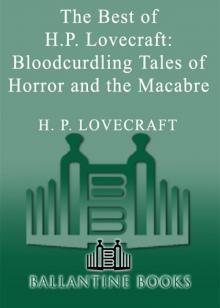 The Best of H.P. Lovecraft
The Best of H.P. Lovecraft The Definitive H.P. Lovecraft: 67 Tales Of Horror In One Volume
The Definitive H.P. Lovecraft: 67 Tales Of Horror In One Volume The Complete Works of H.P. Lovecraft
The Complete Works of H.P. Lovecraft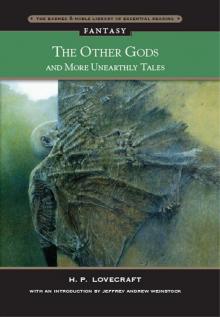 Other Gods and More Unearthly Tales
Other Gods and More Unearthly Tales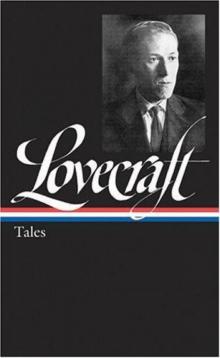 Lovecraft's Fiction Volume I, 1905-1925
Lovecraft's Fiction Volume I, 1905-1925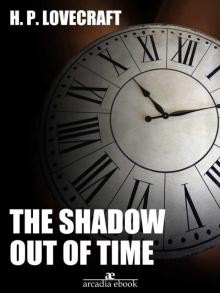 The Shadow Out of Time
The Shadow Out of Time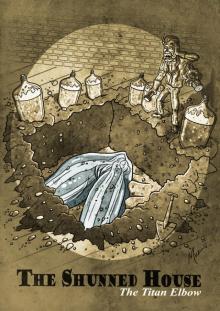 The Shunned House
The Shunned House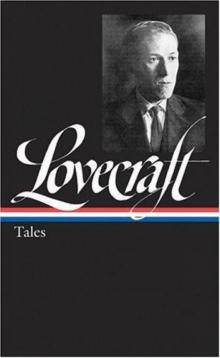 Lovecraft's Fiction Volume II, 1926-1928
Lovecraft's Fiction Volume II, 1926-1928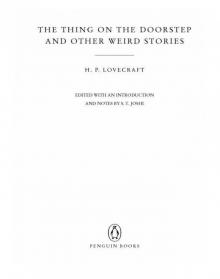 The Thing on the Doorstep and Other Weird Stories
The Thing on the Doorstep and Other Weird Stories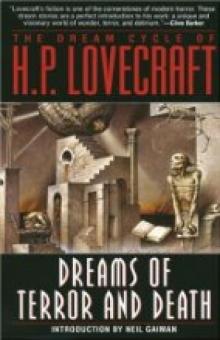 Dream Cycle of H. P. Lovecraft: Dreams of Terror and Death
Dream Cycle of H. P. Lovecraft: Dreams of Terror and Death Great Tales of Horror
Great Tales of Horror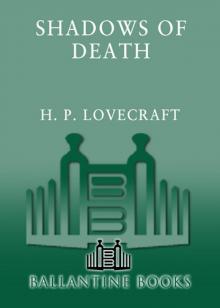 Shadows of Death
Shadows of Death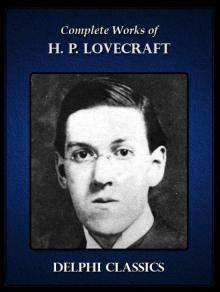 Delphi Complete Works of H. P. Lovecraft (Illustrated)
Delphi Complete Works of H. P. Lovecraft (Illustrated) Waking Up Screaming: Haunting Tales of Terror
Waking Up Screaming: Haunting Tales of Terror H.P. Lovecraft Goes to the Movies
H.P. Lovecraft Goes to the Movies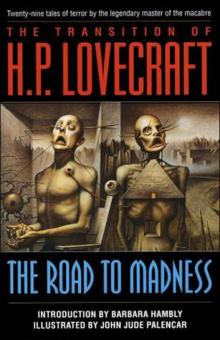 The Road to Madness
The Road to Madness The Complete H.P. Lovecraft Reader (68 Stories)
The Complete H.P. Lovecraft Reader (68 Stories)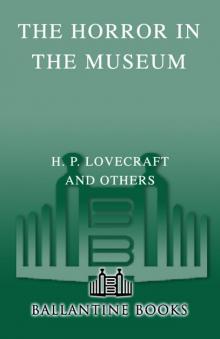 The Horror in the Museum
The Horror in the Museum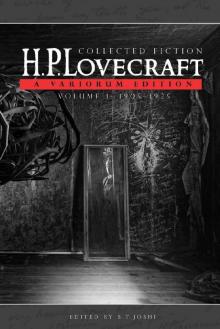 Collected Fiction Volume 1 (1905-1925): A Variorum Edition
Collected Fiction Volume 1 (1905-1925): A Variorum Edition Lovecrafts_Fiction, vol.I_1905-1925
Lovecrafts_Fiction, vol.I_1905-1925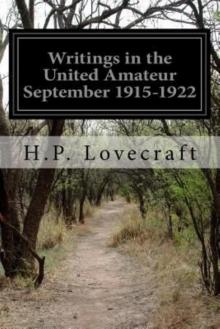 Writings in the United Amateur, 1915-1922
Writings in the United Amateur, 1915-1922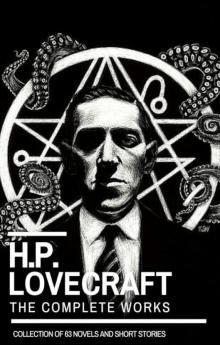 H.P. Lovecraft: The Complete Works
H.P. Lovecraft: The Complete Works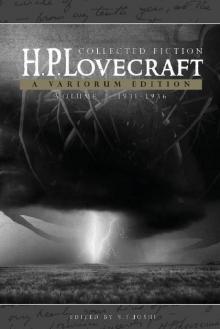 Collected Fiction Volume 3 (1931-1936): A Variorum Edition
Collected Fiction Volume 3 (1931-1936): A Variorum Edition H.P. Lovecraft: The Complete Fiction
H.P. Lovecraft: The Complete Fiction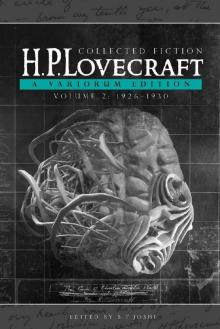 Collected Fiction Volume 2 (1926-1930): A Variorum Edition
Collected Fiction Volume 2 (1926-1930): A Variorum Edition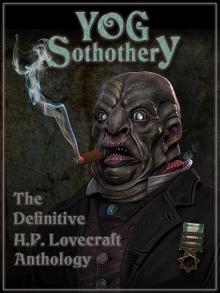 Yog Sothothery - The Definitive H.P. Lovecraft Anthology
Yog Sothothery - The Definitive H.P. Lovecraft Anthology The Complete H.P. Lovecraft Collection (Xist Classics)
The Complete H.P. Lovecraft Collection (Xist Classics)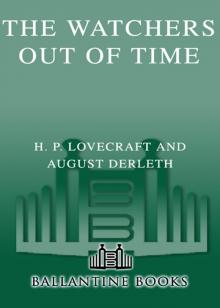 The Watchers Out of Time
The Watchers Out of Time Eldritch Tales
Eldritch Tales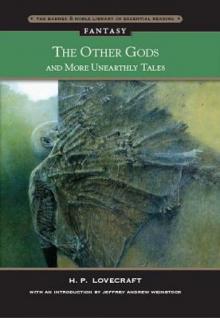 The Other Gods And More Unearthly Tales
The Other Gods And More Unearthly Tales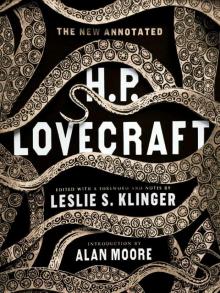 The New Annotated H. P. Lovecraft
The New Annotated H. P. Lovecraft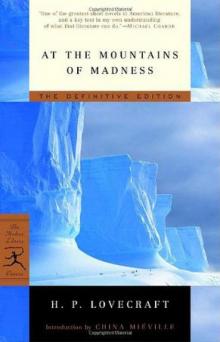 At the mountains of madness
At the mountains of madness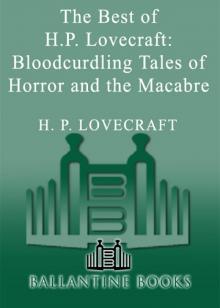 Bloodcurdling Tales of Horror and the Macabre
Bloodcurdling Tales of Horror and the Macabre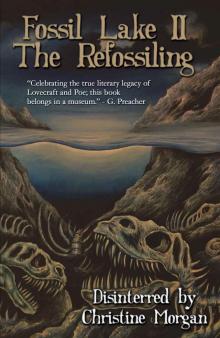 Fossil Lake II: The Refossiling
Fossil Lake II: The Refossiling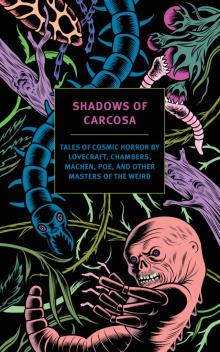 Shadows of Carcosa: Tales of Cosmic Horror by Lovecraft, Chambers, Machen, Poe, and Other Masters of the Weird
Shadows of Carcosa: Tales of Cosmic Horror by Lovecraft, Chambers, Machen, Poe, and Other Masters of the Weird H. P. Lovecraft
H. P. Lovecraft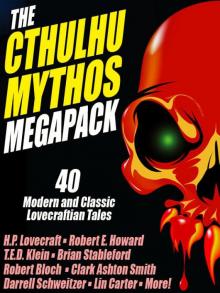 The Cthulhu Mythos Megapack
The Cthulhu Mythos Megapack The Complete H. P. Lovecraft Reader (2nd Edition)
The Complete H. P. Lovecraft Reader (2nd Edition) The Complete Fiction
The Complete Fiction Waking Up Screaming
Waking Up Screaming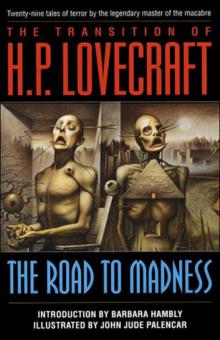 Transition of H. P. Lovecraft
Transition of H. P. Lovecraft![[1935] The Shadow Out of Time Read online](http://i1.bookreadfree.com/i2/04/12/1935_the_shadow_out_of_time_preview.jpg) [1935] The Shadow Out of Time
[1935] The Shadow Out of Time The Horror Megapack
The Horror Megapack